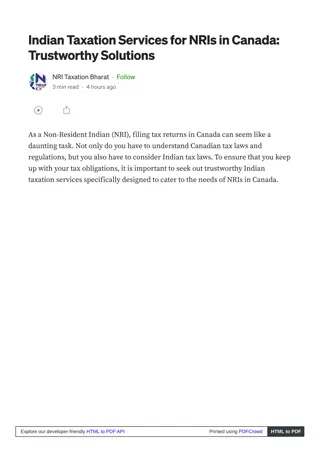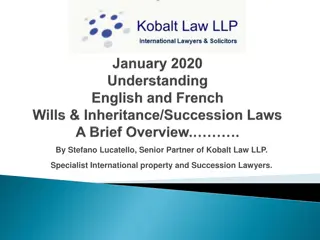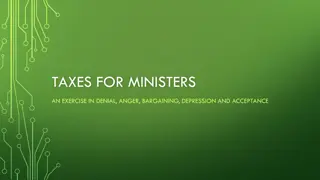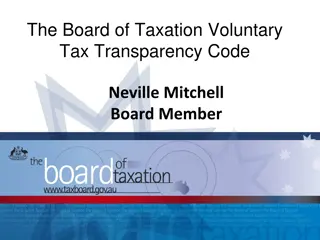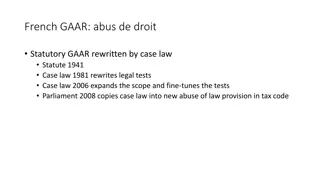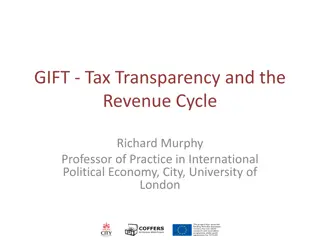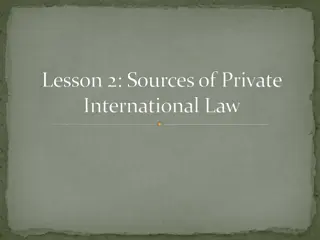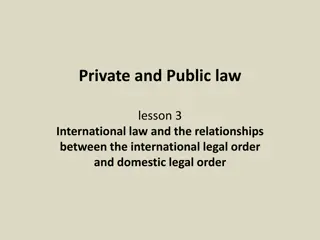Advanced International Tax Law: General Principles and Italian Perspectives
International tax law encompasses rules governing states' taxing powers and cross-border taxation cases. Explore the sources of international law, customs, and treaties in relation to tax, along with principles like exclusivity, double taxation, and treaty execution. Delve into income taxes, tax treaties, and the intricacies of international taxation from a comprehensive perspective.
Download Presentation

Please find below an Image/Link to download the presentation.
The content on the website is provided AS IS for your information and personal use only. It may not be sold, licensed, or shared on other websites without obtaining consent from the author.If you encounter any issues during the download, it is possible that the publisher has removed the file from their server.
You are allowed to download the files provided on this website for personal or commercial use, subject to the condition that they are used lawfully. All files are the property of their respective owners.
The content on the website is provided AS IS for your information and personal use only. It may not be sold, licensed, or shared on other websites without obtaining consent from the author.
E N D
Presentation Transcript
Advanced International Tax Law Eugenio della Valle - Tax Law Full Professor
GENERAL PRINCIPLES Preliminary notes: International law of taxation (rules on States taxing powers) and International tax law (domestic rules on cross-border cases): in practice international tax law may be used to comprise both set of rules The concept of tax: taxes involved by international tax law (main ones are income taxes, wealth taxes, customs duties and VAT) Entities involved: individuals, companies (partnerships, limited liability companies, corporations, other organizations, trusts, investment and pension funds, etc.) The Italian perspective of international tax law: the Italian tax system from the constitutional framework to down to the single taxes
GENERAL PRINCIPLES Sources of international law (art. 38 of the ICJ s Statute): - International custom (i.e. territorial sovereignty: the right to exercise full and exclusive authority over its own territory); - The general principles of law recognized by civilized nations; - International conventions (treaties) As to taxes, domestic rules, however, need to be considered in their interaction with the sources above together wit the EU ones (mainly EU regulations and self-executing directives) Custom: repetictio facti (practice uninterrupted over time) and opinio iuris ac necessitatis (confidence the behaviour is legally required) Customary rules: (i) power of taxation sufficiently and reasonably connected to the territory; (ii) a State cannot tax another State as to either activities performed in the former or income therein produced (see SC no. 11788/1991); (iii) exemption for diplomatic agents and representatives of another State (for the institutional functions) According to art. 10 of the Italian Constitution customary rules and general principles of law prevail over domestic rules (see also art. 117)
GENERAL PRINCIPLES Principle of exclusivity of tax law (stemming from the territorial sovereignty) and the administrative cooperation to carry out tax audit or recover unpaid taxes International double taxation (juridical and economic) is not forbidden in principle Doble taxation: remedies (unilateral domestic provisions or DTT). Exemption and credit method. Income taxes and taxation principles: worldwide (residence or citizenship) vs/ territorial (or source). International treaties for the avoidance of double taxation (exeptionally also the economic one): models (OECD, UN, USA/Netherlands). Taxes involved: income and capital as well as inheritance and gifts. Treaties purpose, execution (whether bilateral or multilateral) and interpretation. 1969 Vienna Convention on the Law of Treaties. Treaty making process (negotiation, adoption and signature, ratification, exchange or deposit of ratifications).
GENERAL PRINCIPLES Artt. 31-33 1969 Vienna Convention on the Law of Treaties 31 (primary means of interpretation): a treaty shall be interpreted in good faith in accordance with the ordinary meaning to be given to the terms of the treaty in their context and in the light of its object and purpose ; 32 (supplementary means of interpretation): recourse may be had to supplementary means of interpretation, including the preparatory work of the treaty and the circumstances of its conclusion, in order to confirm the meaning resulting from the application of art. 31, or to determine the meaning when the interpretation according to art. 31: )a) leaves the meaning ambiguous or obscure; or (b) leads to a result which is manifestly absurd or reasonable ; Art. 33 (language relevance): when a treaty has been authenticated in two or more languages, the text is equally authoritative in each language, unless the treaty provides or the parties agree that, in case of divergence, a particular text shall prevail
GENERAL PRINCIPLES The OECD Commentary role, including the relevant updates (see, among others, Cass. no. 23984/2016 and no. 3889/2014) Prevalence of the treaty over the domestic provisions (artt. 75 of Presidential Decree no. 600/1973 and 41 of Presidential Decree no. 601/1973) The aim of a DTT (alias double taxation treaty): allocating taxing powers and eliminating discriminatory taxation The OECD model convention structure (versions 1963, 1977, 1992, 2017): territorial scope, taxes and persons covered, items of income
EUROPEAN TAXATION: introduction Prof. Avv. Eugenio della Valle Full professor of Tax Law Sapienza University of Rome Department of Law and Economics of Productive Activities
TABLE OF CONTENT TFEU framework: objectives: the internal market & EMU, fundamental freedoms, tax rules, rules for EMU. Milestones in non-tax cases: historical development of the non- discrimination principle. ECJ case law in indirect taxation ECJ case law in direct taxation
TABLE OF CONTENT Application of EU state aid law in direct taxation EU directives on direct taxation: parent subsidiary (dividends), mergers & business reorganisations, interest royalties, (savings directive). EU directives on administrative cooperation, exchange of information (EoI) & recovery of tax claims.
TABLE OF CONTENT Anti-tax avoidance directive (ATAD) DAC on reportable cross-border arrangements Proposals on CCCTB, double taxation dispute resolution mechanisms, CIT of significant digital presence and Digital Services tax.
I TFEU Framework Fundamental aims of the EU (Art. 3 TEU): 3.3 Internal market: an area of free and fair competition, without internal frontiers, with free movement of goods, persons, services and capital. 3.4 Economic and monetary union (EMU), whose currency is the euro.
TFEU Framework Exclusive competences of EU (Art. 3 TFEU): (a)Customs union (b)Establishing competition rules for the internal market (c)Monetary policy for EURO Member States (d)Marine biology and fisheries (e)Common commercial policy
TFEU Framework Shared competences (Art. 4 TFEU): (a)internal market (b)social policy (c)economic and social cohesion (e)environment (f)consumer protection (g)transport (i) energy
TFEU Framework Objective of internal market art.26 1. The Union shall adopt measures with the aim of establishing or ensuring the functioning of the internal market. 2. The IM is an area without internal frontiers in which the free movement of goods, persons, services and capital is ensured in accordance with the provision of the Treaties.
TFEU Framework Requirements internal market Abolition of all obstacles to cross-border movements of goods, persons, capital and businesses Equal treatment between domestic and foreign products, persons, capital and enterprises Internal market does not require full uniformity of major national taxes, or full EU control on national or EU taxes for a common EU budget
TFEU Framework Requirements for EMU As a minimum a separate and autonomous common EU monetary fund (EUMF) to back up monetary operations by the ECB A common EU budget to steer the common economic policy in support of the currency Both the EU fund and budget need to be automatically financed by taxes specifically imposed and controlled by the EU
TFEU Framework Requirements internal market Internal market does neither require full harmonisation, nor uniformity of major national taxes, nor full EU control on national or EU taxes for a common EU budget Requirements for EMU EMU does require common budget & the power for the EU to raise its own taxes, independently from the Member States
TFEU Framework Internal Market Art. 28: Free movement of goods Art. 30-32: Customs union Art. 34-37: Prohibition of quantitative restrictions and measures having an equivalent effect Art. 45-66: Principles of non-discrimination and non-restriction Art. 107-109: State Aid Art. 110-113: Provisions on indirect taxation
Free movement of goods Art. 28 TFEU Full customs union of all Member States Common external customs tariff with third countries Prohibition of all quantitative import restrictions and measures having equivalent effect
Free movement of goods Art. 30 TFEU Prohibition on import and export duties and charges having equivalent effect Art. 31 TFEU Common Customs Tariff Duties shall be fixed by the Council on a proposal from The Commission. The only taxing power of EU!
Free movement of goods Art. 36 TFEU Allows restrictions on imports, exports or goods in transit justified on grounds of public morality, public policy or public security, the protection of health and life of humans, animals or plants, the protection of national treasures, possessing artistic, historic or archaeological value, or the protection of commercial property. Such restrictions shall not constitute a means of arbitrary discrimination.
Free movement of persons, services and capital Art. 45-48 TFEU Free movement of workers abolition of any discrimination on the basis of nationality Art. 49-55 TFEU Freedom of establishment Art. 56-62 TFEU Freedom to provide cross-border services Art. 63-66 TFEU Free movement of capital - between Member States - between Member States and third countries
Free movement of persons, services and capital Art. 65 TFEU For tax purposes a distinction can be made between taxpayers who are not in the same situation with regard to their place of residence, or the place of capital investment, provided the restrictions do not constitute an arbitrary form of discrimination, or an indirect way of restriction of capital movement
TFEU exceptions to freedoms Art. 45.3: It shall entail the right(s) subject to limitations justified on grounds of public policy, public security or public health Art. 65.1: .. Art. 63 shall be without prejudice to the right of the M.S.: a. to distinguish between taxpayers who are not in the same position with regard to their place of residence or the place where their capital is invested b. to take all measures to prevent infringements of national law and regulations, in particular in the field of taxation. Art. 65.3: The(se) measures shall not constitute a(n) of arbitrary discrimination or a disguised restriction
TFEU rules on State Aid Art. 107 TFEU No state aid which amounts to a distortion of competition, or which is incompatible with the common market. Unconditional Exceptions: Social aid to consumers Relief for natural disasters Aid to Bundeslaender Conditional exceptions: Regional aid to underdeveloped regions European project aid, elimination of distortions of competition Cultural aid (cultural heritage) Art. 108 FEU: appreciation by commission
Indirect Taxation Art. 110 TFEU No internal taxation (directly or indirectly) on products from other MS in excess of the tax imposed on similar domestic products No tax that constitutes an indirect protection of domestic products
Indirect Taxation Art. 113 TFEU EU shall act unanimously to harmonise turn over taxes, excises and other forms of indirect taxation, to the extent necessary for the establishment of the internal market.
Approximation of laws Art. 114 -Power to approximate laws by way of directive for provisions laid down by law, regulation or administrative action in MS which have as their object the establishment of the internal market (objectives art. 26), except for fiscal provisions. -Voting by majority or qualified majority vote in accordance with ordinary legislative procedure. (Art. 238 & 294 TFEU)
Approximation of laws Art. 114.4 -MS may maintain national exceptions on the base of art. 36 = identical exceptions to qunatititative restrictions on movement to goods. - But control of the Commission, whether the measure is arbitrary & control by the EUCJ.
Approximation of laws Art. 115 -Same power for the Council acting unanimously to issue directives for the approximation of laws, regulations of administrative action of the MS (including tax laws) as directly affect the establishment or functioning of the internal market. -Realisation of objectives of art. 26. -No control by Commission of EUCJ.
Fiscal framework for EMU No power to raise revenue for own resources through taxes Art. 121: MS shall coordinate their economic policies within the Council within broad EU guidelines. Instruments of coordination are monitoring & recommendations on the basis of mutual surveillance (Art. 121) & excessive spending procedure (Art. 126) Criteria of Stability & Growth Pact: budget deficit < 3% GDP, public debt < 60% GDP
Fiscal framework for EMU Prohibition of financial assistance Art. 122.2: Commission may grant financial assistance in case of national disaster and exceptional occurrences Art. 123.1: No financial help from ECB to any EU institution or MS. Prohibition of direct purchase of debt instruments by ECB from MS Art. 125: EU shall neither assume nor be liable to debt of any MS, and MS shall not be liable to debt of any other MS
Fiscal framework for EMU Specific rules for EMU Art. 136: Council shall adopt measures specific to those MS, whose currency is the : to strengthen coordination and for budgetary discipline of MS To set out economic policy guidelines for MS that are compatible with the EU as a whole. Only MS vote by qualified majority.
Fiscal framework for EMU Specific rules for EMU A third specific measure was approved unanimously in 2012 by all MS to set up the European Stability Mechanism (ESM) to provide the financial means to support weaker states. Art. 136.3: integration of ESM in TFEU was approved with lopsided majorities by all MS, with Czechia the last on 23.04.2013. Until now national movements for democracy have delayed ratification by court procedures!!
Fiscal framework for EMU Specific rules for EMU Art. 137: Protocol for separate meetings of group Art. 138: Council shall adopt appropriate measures to ensure unified representation in international institutions and conferences
Fiscal framework for EMU The EU budget and EMU Total EU budget in 2017 = 150 bill. = 1% of EU GDP Total national budgets of all MS in 2015 > 6.000 bill. = 50,7% of EU GDP Total budget of all MS = more than 40 x EU budget
Judicial framework for EMU ECJ has a mandate to enforce primary and secondary EU law ECJ has authority to strike down national tax rules that violate the treaty in situations dealing with the internal market ECJ has authority to interprete substantive tax rules of harmonised taxes ECJ has no authority to intervene in substantive issues of income tax and social security that matter for EMU
II The case Law of the European Court of Justice in milestone cases and indirect taxation
MILESTONE NON TAX CASES text nrs. 4.2-4.3 Sotgiu v Deutsche Bundespost, 152/73, 12.02.1974 indirect discrimination Reyners v Belgian State, 2/74, 21.06.1974 treaty freedoms have direct effect Procureur du Roi v Dassonville, 8/74, 11.07.1974 All trading restrictions are measures having equivalent effect
MILESTONE NON TAX CASES text nrs. 4.2-4.3 Rewe v Bundesmonopolverwaltung f r Branntwein (Cassis de Dijon), 120/78, 20.02.1979 Justifications based on the rule of reason Knoors, 115/78, 07.02.1979 Freedoms do not allow abuse of community law Union royale belge des soci t s de football v Jean-Marc Bosman, C- 415/93, 15.12.1995 Outgoing movements are also subject to freedoms
Sotgiu v Deutsche Bundespost, 152/73, 12.02.1974 The rules regarding equality of treatment forbid not only overt discrimination by reason of nationality but also covert forms of discrimination which, by the application of other criteria of differentiation, lead in fact to the same result. the taking into consideration, as a criterion for the grant of a separation allowance, of the fact that a worker has his residence in the territory of another Member State may, according to the circumstances, constitute discrimination.
Sotgiu v Deutsche Bundespost, 152/73, 12.02.1974 This case establishes concept of indirect or covert discrimination. There is also discrimination on the basis of nationality, when the criterion of distinction is different from nationality, but when the effect of using that criterion is that mostly non-nationals will be disadvantaged.
Reyners v Belgian State, 2/74, 21.06.1974 Argument by the Member States: the form chosen by the Treaty for these implementing acts (directives) confirms that art. 52 (43) does not have direct effect. It is not for the courts to exercise a discretionary power reserved to the legislative institutions of the Community and the Member States . In laying down that the freedom of establishment shall be attained at the end of the transitional period, art. 52 (43) imposes an obligation to attain a precise result the fact that this progression has not been adhered to leaves the obligation itself intact beyond the end of the period provided for its fulfilment.
Reyners v Belgian State, 2/74, 21.06.1974 It is not possible to invoke against such an effect the fact that the Council has failed to issue the directives provided for by the articles 54 (44) and 57 (47) or the fact that certain of the directives actually issued have not fully attained the objective of non- discrimination required by art. 52 (43).
Reyners v Belgian State, 2/74, 21.06.1974 Fundamental freedoms (the right of establishment) have direct effect. It is not necessary to have implementing directives, even when such directives are provided for in the treaty. Otherwise the MS could block the implementation of the freedoms to which they have agreed.
Procureur du Roi v Dassonville, 8/74, 11.07.1974 All trading rules enacted by Member States which are capable of hindering, directly or indirectly, actually, or potentially, intra-Community trade are to be considered as measures having an equivalent effect to quantitative restrictions and are prohibited under the EC treaty. Any trading restriction on intra-community trade is a measure equivalent to a quantitative restriction.
Cassis de Dijon, 120/78, 20.02.1979 Failing harmonisation, disparities in national laws could give rise to trade obstacles, which are to be considered as obstacles to the free movement. Rule of reason: obstacles to movement within the Community resulting from disparities between the national laws relating to marketing of the products must be accepted in so far as those provisions may be recognised as being necessary in order to satisfy a.o. mandatory requirements relating in particular to the effectiveness of fiscal supervision, protection of public health etc.
Van Binsbergen, 33/74, 03.12.1974 Right to represent a client as a legal representative in court proceedings, when advocates are not mandatory. The capacity of Van Binsbergen to represent clients in NL was contested after he moved his residence from NL to Belgium. The national law of a MS cannot, by imposing a requirement as to the habitual residence within that state, deny persons established in another MS the right to provide services, where these services are not subject to any special condition under the national law applicable.
Van Binsbergen, 33/74, 03.12.1974 A MS cannot be denied the right to take measures to prevent the exercise of the freedom to provide services by a person providing services whose activity is entirely or principally directed towards it territory for the purpose of avoiding professional rules of conduct which would be applicable to him if he were established within that state. Such a situation may be subject to judicial control under the provisions of the chapter relating to the right of establishment and not of that of the provision of services.
J.Knoors, 115/78, 07.02.1979 Although the freedoms of establishment and to provide services do not apply to purely internal situations, they cannot be interpreted in such a way as to exclude nationals from a MS who have lawfully resided in another MS from access to a trade or profession in their former MS of origin, when they have acquired abroad qualifications for such trade or profession that are recognised under community law. Freedoms do not permit abuse of EU law to circumvent national law.
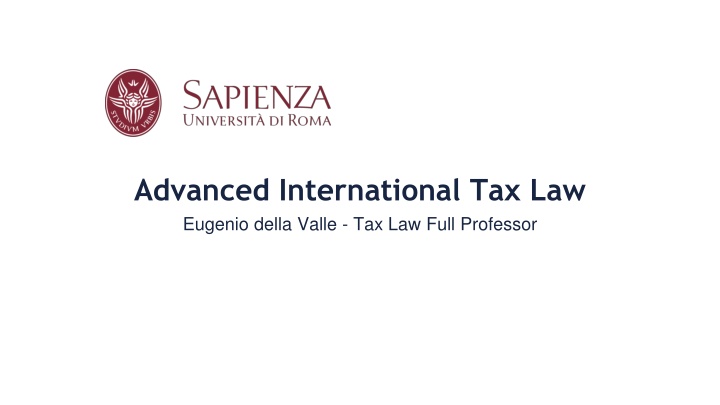

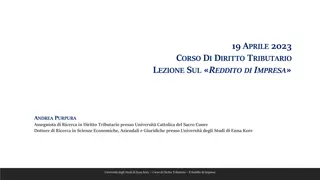
![Town of [Town Name] Real Estate Tax Rates and FY 2024 Budget Summary](/thumb/62211/town-of-town-name-real-estate-tax-rates-and-fy-2024-budget-summary.jpg)

